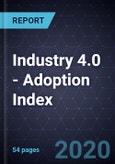Where are the End Users?
While several manufacturing enterprises are still struggling to understand what Industry 4.0 implementation really means to them, the benefits that Industry 4.0 promises to deliver are too hard to ignore. Globally, several strategic initiatives that can guide manufacturers to successfully manage their digital transformation journey are underway. Several early proofs-of-concept and pilot implementations are trying to establish the case for industry 4.0.
There has been a varying degree of adoption of Industry 4.0 - from lukewarm reception to fully-operational digital technologies to finally broadly automated smart factories. The highest adoption and potential for future Industry 4.0 implementation has been observed in innovation-driven industries such as automotive, aerospace, and food and beverage. This can be attributed to the already-high levels of digital adoption in these industries. The next most promising verticals for adoption are industries such as hi-tech, life sciences, and oil and gas. In these industries, there are lesser chances of digital disruptions that could result in the transformation of business models and processes. However, it is clear that these industries are the most likely to undergo resource efficiency improvements, with the implementation of industry 4.0. In industries such as pulp and paper and water and wastewater, there has been limited adoption at this stage. Industry 4.0 is still at a nascent phase. Organizations across industries are still in the process of evaluating the merits and demerits of Industry 4.0. Widespread implementation is, therefore, not expected before 2030.
The pursuit of something better has always been the driving force of evolution, and the industrial sector has not been an exception. The concept of Industry 4.0 revolves around integrating information technology (IT) and operational technology (OT) with near-real-time connectivity in order to provide actionable intelligence to decision-makers. However, Industry 4.0 relies heavily on automation and has been intimidating workers on factory shop floors.
The publisher envisions a futuristic scenario of the next big thing - Industry 5.0, which will bring back empowered humans to the shop floor. Industry 5.0 will take the execution of Industry 4.0 a step further, along with business model innovation and customer experience management. However, it is to be noted that the advent of Industry 5.0 will not put a stop to Industry 4.0; instead, the 2 revolutions will transpire concurrently.








